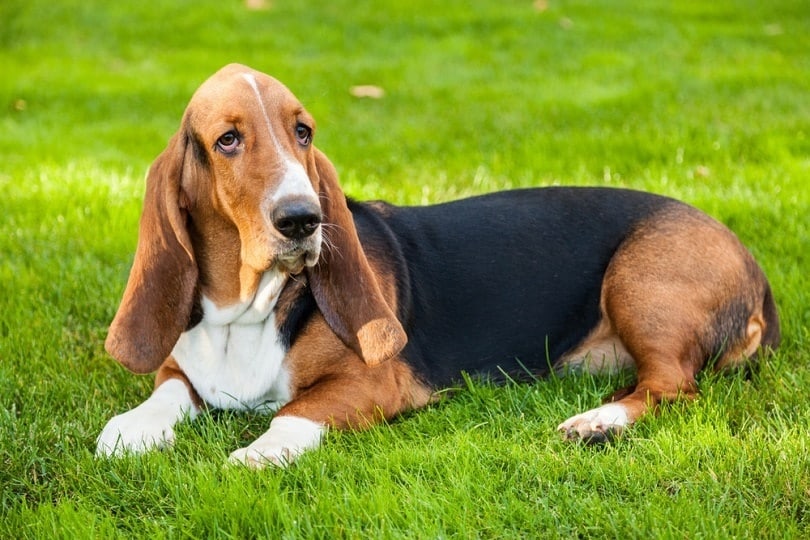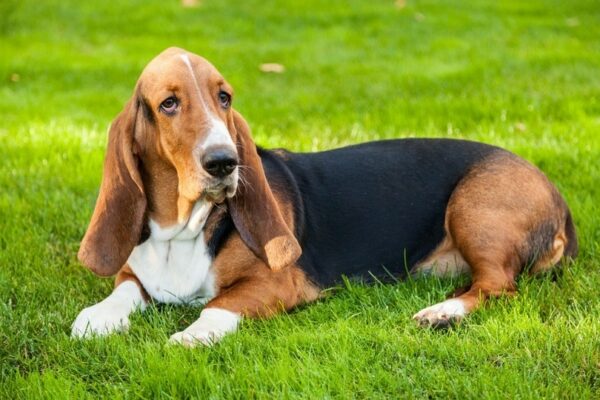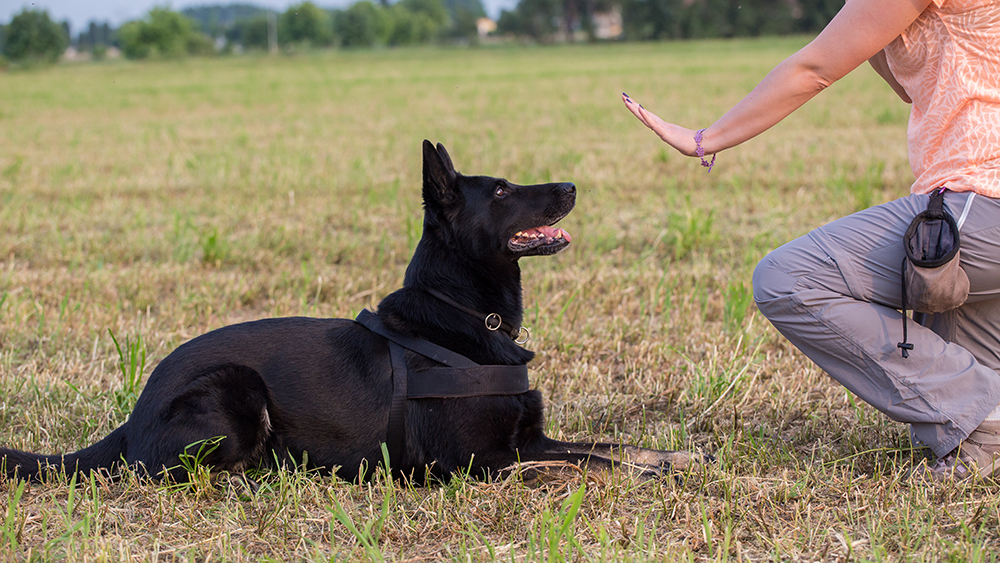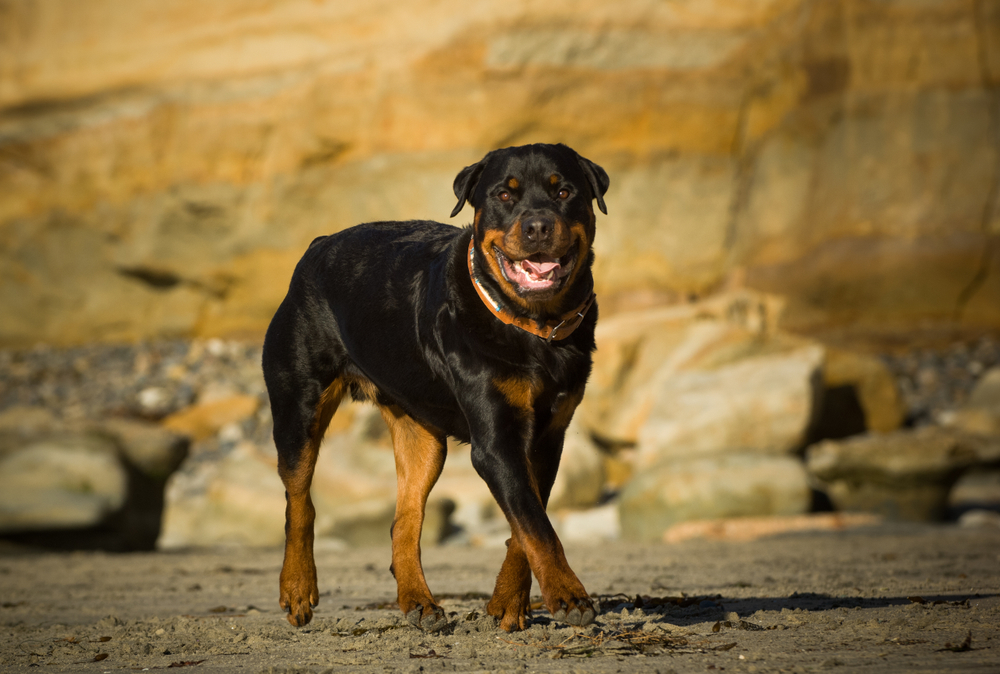Click Below to Skip Ahead
There’s just something endearing about a dog with big ears and an even bigger personality, and the Basset Hound fits the bill. They aren’t as common as, say, Golden Retrievers, but they are exceptional dogs that are far livelier and more than the “lazy Basset” perception many people have. If you’re interested in the low-key Basset Hound, keep reading.
Breed Overview
Height:
Up to 15 inches
Weight:
40–65 pounds
Lifespan:
12–13 years
Colors:
Black, brown, white, tan, lemon, mahogany, bicolor, tricolor
Suitable for:
Active dog owners experienced with stubborn breeds, hunters, outdoorsy types
Temperament:
Loyal, laid back, stubborn
If you’ve ever laid eyes on a Basset Hound, you may have made the mistake of thinking that they’re a smaller dog breed. These dogs may be short, but they have thick, powerful bodies and the endurance to pursue prey for hours. They’re excellent scent dogs with a powerful sense of smell and intense instincts to pursue interesting scents. The Basset Hound has the quintessential hound dog stubbornness, but they are also steadfastly loyal.
Basset Hound Characteristics
Basset Hound Puppies
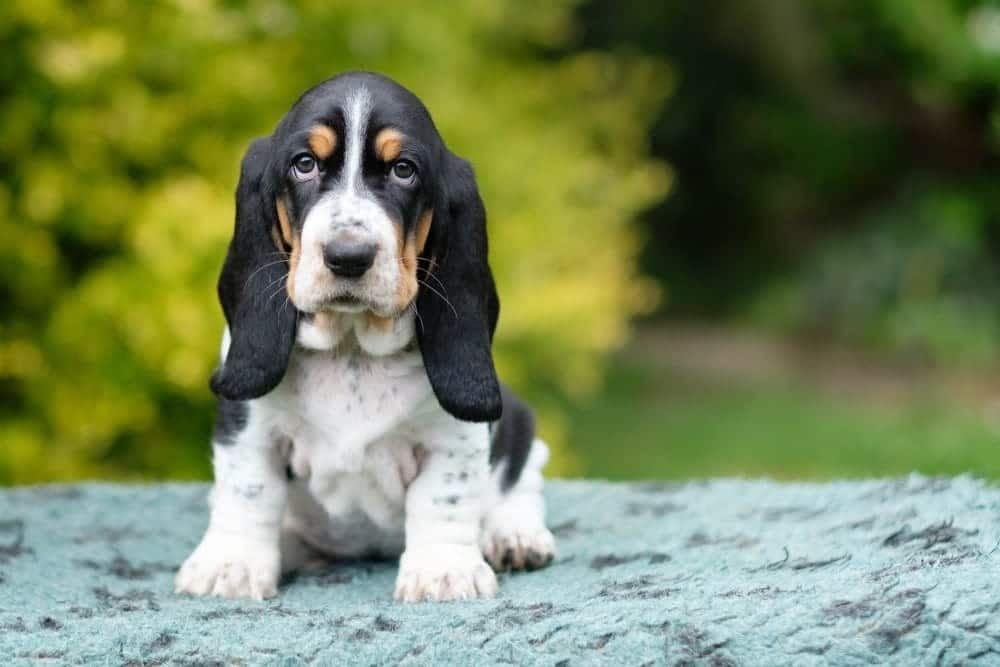
It’s undeniable that Basset Hound puppies are some of the cutest puppies on the planet, thanks to their oversized ears and tendency to trip on them. This can lead to them going to inappropriate homes with people who are attracted to their cuteness yet not ready to handle a stubborn hound. They can sometimes be found in shelters and rescue organizations, particularly in the Southern US, where hounds are popular.
Because of some of the health issues they’re prone to, it’s ideal to only get a puppy from a breeder who has received all health tests recommended by an official Basset Hound club. Like adult Bassets, the puppies are pretty easy-going and friendly, but you should be prepared to handle a stubborn puppy with strong instincts to follow the trail of scents they find interesting.
Temperament & Intelligence of the Basset Hound
Although you might not assume it from their goofy appearance, Basset Hounds are intelligent dogs with strong problem-solving abilities. When dealing with a Basset, their intelligence isn’t the issue, but their stubbornness will be. Intelligence aside, the Basset is independent and loves to explore on their own. They don’t have an ardent desire to please their people, but it is possible to train them with enough know-how and persistence.
Are These Dogs Good for Families? 👪
Bassets are suitable for families, and they’re known for being good with small children. They are usually gentle and unlikely to get overly excited and accidentally hurt a small child like other hunting dogs. It should be noted that Bassets aren’t overly affectionate dogs, so don’t expect a loving lap dog.
Does This Breed Get Along With Other Pets?
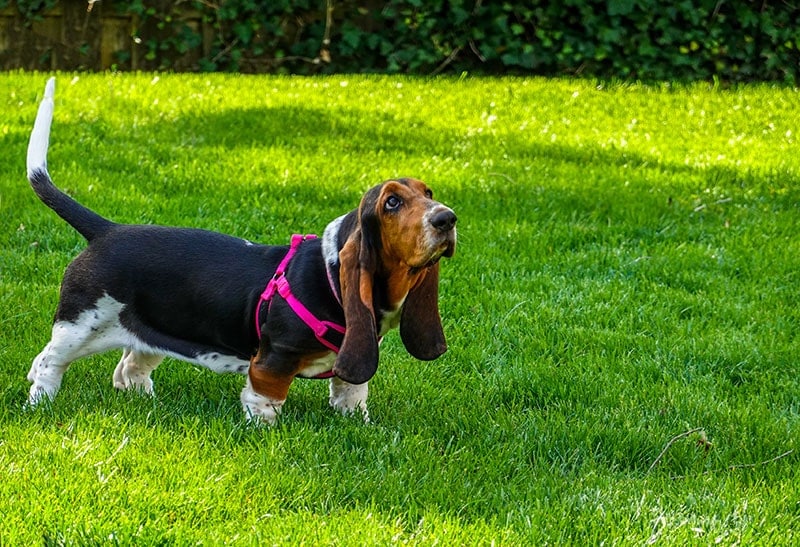
Like many hounds, the Basset is ideal for owners with other pets, especially dogs. Many hounds have been bred to work together as a pack, so they’re naturally tolerant of the presence of other dogs. They may view cats and small animals as prey worth following, so set strict expectations for how your Basset behaves toward cats or smaller pets in the home. Ensure your dog is only in the presence of small animals when an adult supervising them.
Things to Know When Owning a Basset Hound
Food & Diet Requirements 🦴
The amount of your serve daily depends largely on how active your Basset is. Regardless of their activity level, high-quality, WSAVA-compliant dog food is ideal. Bassets are prone to obesity and can be quite lazy, so feeding an appropriate amount to maintain a healthy body weight is exceptionally important.
Your vet can help you determine your dog’s ideal body weight and how much you should be feeding them. When it comes to the Basset, it’s best to keep them slightly on the thin side instead of allowing them to become overweight since extra weight on their short legs can cause serious joint problems.
Exercise 🐕
Although Basset Hounds have the stamina to follow a scent trail for hours, they can be lazy. You will likely have to motivate your Basset to get off the couch to play and exercise. Lean into your dog’s instincts when it comes to exercise by introducing nose work. Hiking and visits to local parks are also effective ways to get your Basset up and moving while allowing them to appease their instinctual desire to sniff.
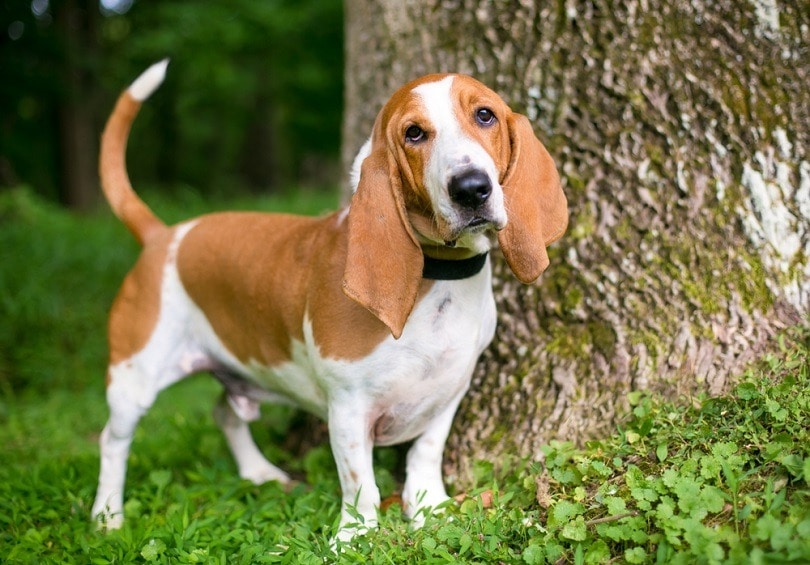
Training 🎾
Consistency is critical to training a stubborn breed like the Basset Hound. You need to keep training sessions interesting and short and find ways to engage your pup in training. Since Bassets aren’t particularly interested in pleasing you, it can be difficult to find the right motivation for training them. High-value rewards, like low-calorie treats and interesting toys, are good options for motivating your Basset to learn during training sessions.
Grooming ✂️
The Basset Hound has a short coat that requires minimal maintenance. However, they’re prone to skin problems, so it’s important to bathe and brush your dog every few weeks with a dog-safe shampoo. Overbathing can dry out the skin and cause problems. If your dog requires medicated baths, talk to your vet about how frequently they need them.
Keep their nails trimmed short to avoid nail breaks or stress on the feet and joints. You must also inspect your Basset’s ears to ensure they stay clean and dry. Due to their long, floppy ears, they may need routine ear cleaning.
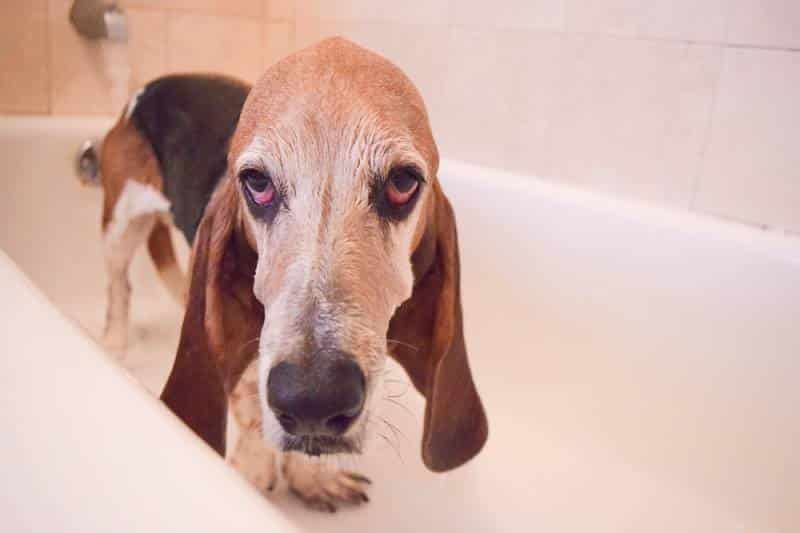
Health and Conditions 🏥
Basset hounds are vulnerable to several health conditions, but you can keep them healthy by feeding them high-quality food, exercising them regularly, and maintaining veterinary appointments. When they enter their senior years, they’ll need to visit the vet at least twice a year.
- Patellar luxation
- Dental disease
- Ear infections
- Skin infections
- Lafora disease
- Mucopolysaccharidosis I
- Thrombopathia
- Primary open-angle glaucoma (POAG)
- Hip dysplasia
- Elbow dysplasia
- Arthritis
- Hypothyroidism
- Spinal injuries
- Bloat
Male vs. Female
As is common in many breeds, male Bassets are larger and heavier than females. Females tend to have a better attention span but aren’t necessarily easier to train than males. The stubbornness and lack of desire to please impact male and female Basset Hounds equally. Females can be a little sassier and more independent than males, while males are often considered more overtly affectionate and laid-back. However, this is just a generalization and largely depends on the individual.
3 Little-Known Facts About the Basset Hound
1. They Have an Excellent Sense of Smell
You might be surprised to learn that Basset Hounds have an incredible sense of smell. Their scenting skills are only surpassed by those of the Bloodhound. Believe it or not, the Basset Hound’s long ears move scents up toward their nose, and the loose skin on their face helps to trap scents. Also, they have over 220 million scent receptors!
2. They’re Dense Dogs
No, we aren’t disparaging Basset Hounds by calling them dense. They have the highest amount of bone per pound of body weight of all domestic dog breeds. While they stand up to 15 inches tall, a body weight up to a whopping 65 pounds is considered within the breed’s standard.
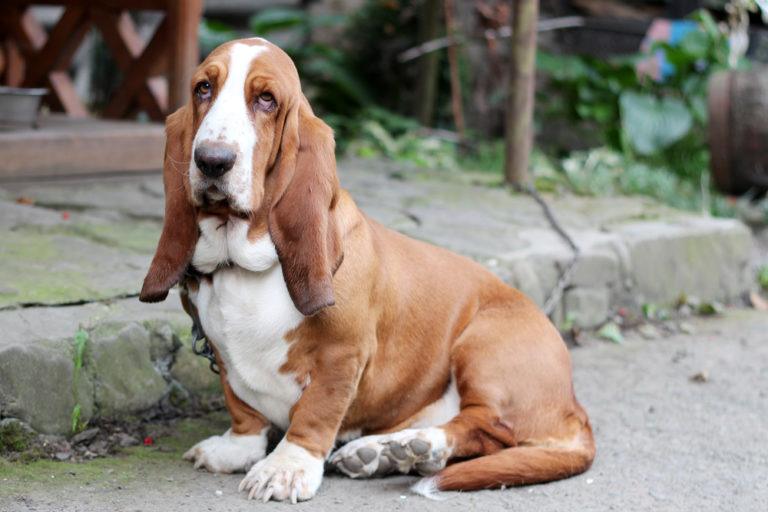
3. They’re Not the Only Bassets
Basset Hounds are just one of many breeds recognized under the umbrella term “Basset.” Several pups carry the Basset name, including Basset Fauve de Bretagne, French Basset Artésien Normand, Grand Basset Griffon Vendéen, and Petit Basset Griffon Vendéen.

Final Thoughts
The Basset Hound is a charming canine that will win just about anyone over. They can be a handful if you’re not experienced with stubborn dogs, however. They make great family pets and are gentle with children, and Basset Hounds usually thrive in homes with other pets, especially dogs.
Featured Image Credit: Billion Photos, Shutterstock

